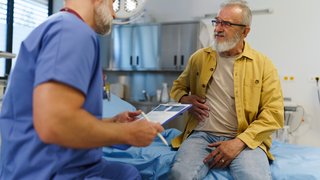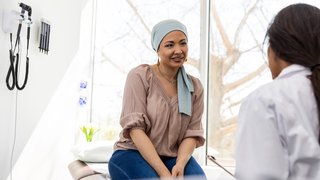
Two years ago, Brianna Hinojosa-Flores was a 41-year-old mother of two who had just been diagnosed with a cancer that’s tough to beat – triple-negative breast cancer. Today she’s back at work as an attorney, serves on her local City Council, enjoys time with her family, and shares her experience with other women who have been diagnosed with triple-negative breast cancer at an early age.
Triple-negative breast cancer is an aggressive type of cancer that does not respond to targeted drug therapies such as Tamoxifen, raloxifene (Evista), or Herceptin. It is associated with the BRCA gene and can affect women of any ethnicity, though it is more common in African-Americans. Women diagnosed with triple-negative breast cancer have a poorer short-term prognosis than those diagnosed with other breast cancer types.
Immediate chemotherapy is vital
Using the drugs we have to treat other types of breast cancer, we started the fight in full force. With triple-negative breast cancer, getting the patient chemotherapy treatment immediately is vital. I work alongside the medical oncologist on the same floor, so I was able to walk in and say, “Here is someone you need to see right away.” With that, Brianna began receiving several months of chemotherapy (Doxorubicin, Cytoxan, and Paclitaxel) that started right away.
After completing her chemo treatments, Brianna followed up with a double mastectomy. At the time of surgery, pathology results confirmed that Brianna had a 100% response to the chemotherapy. No live cancer cells remained in the right breast area, and she did not need additional treatment, such as radiation.
After additional reconstructive surgery, Brianna could move on with her life. She initially came in for checkups every three months; these have now been reduced to every six months. And she’s had some side effects from the treatment, including weight gain, anxiety, difficulty concentrating, fatigue, and hot flashes.
Moving on after breast cancer
Brianna found that the year after breast cancer treatment can be just as difficult as during treatment. “I wasn’t the only one who went through this journey; my whole family was a part of it, and they too need to heal,” Brianna says. “I’ve come to realize (and accept) that I’m never going to be the ‘normal’ I was before. I need to find my new normal, which has included slowing down and reevaluating my priorities.
I’m no longer going 100 miles per hour and living a busy lifestyle. We are focusing on family time and living a healthy lifestyle. As a mother of two with a legal and political career, I’ve learned to engage more with my two children at a level of quality over quantity. I go to all the school parties and on all the field trips. Personally, I am focusing on living in the PRESENT.”
Like many cancer survivors, Brianna is health-conscious. “I run three times a week now (or more),” Brianna adds, “and I ran five miles recently. My kids and I go for walks outdoors or to our local YMCA. Overall, we try to live a healthy lifestyle. The kids want to ride their bikes more and try healthy foods. Meanwhile, I’m making time to sleep as I have come to realize how important it is for your health.”
Even months or years after treatment, some treatment side effects and the risk of cancer recurrence continue for many patients. Every survivor has to learn how to live with these concerns and fears and still find a way to enjoy life. UT Southwestern offers survivor programs in nutrition, exercise, meditation, family relationships, music therapy, and counseling to help our patients adjust to their new lives.
For Brianna, a recent family trip to Hawaii – her first chance to enjoy the water in two years – became part of her new normal.
Brianna is a survivor who’s committed to #CallOutCancer by living a healthier lifestyle with her family. Learn more about cancer prevention, early detection, and treatment options.










